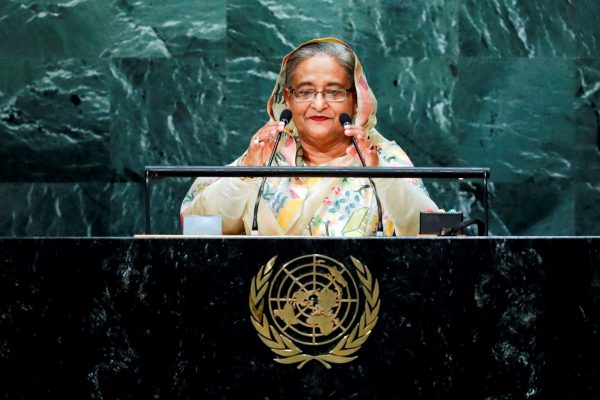The two major political parties in Bangladesh are both run by a prominent political family, and their degrees of internal democracy are very weak. The parties’ poor organisational structures are partly to blame for this situation, as well as the presence of strong centralisation forces and informal decision-making mechanisms that are controlled by the parties’ dynastic leaders and a limited number of party elites.
Partly because of this lack of internal democracy in Bangladeshi political parties, and partly because the dynasty of the main opposition party is broken, democracy is decaying in Bangladesh.
The opposition Bangladesh Nationalist Party (BNP) has been subject to political pressure, court cases and incarceration. The BNP leader Khaleda Zia has had 36 cases brought against her, many of which are allegedly politically motivated. She is currently in jail for graft and corruption and will most likely remain there. Tarique Rahman, her son and acting chairman of the BNP, will probably stay in exile to avoid being arrested on corruption and money laundering charges.
The Sheikh–Wazed dynasty of the ruling Awami League (AL), on the other hand, is flourishing. Awami League is led by Sheikh Hasina, the daughter of the ‘founding father’ of Bangladesh — late president Sheikh Mujibur Rahman who was assassinated in 1975 along with several other members of his family. Hasina was out of the country at the time and survived, and she took over leadership of the party in 1981.
Hasina was prime minister from 1996 to 2001 and again from 2009. During her first premiership, her family established itself as a ruling dynasty, building up political support in government and administration and expanding its economic power.
Hasina’s distant uncle, Zillur Rahman, was president of Bangladesh from 2009 until he died in early 2013. Today, a couple of Hasina’s cousins and other members of the extended family play important roles in the party.
Hasina’s son Sajeeb Ahmed Wazed (also known by his nickname ‘Joy’) is the party leader in waiting, ready to take control when the time comes. Joy joined the party in 2009 as a primary member and he is currently the Prime Minister’s ICT Affairs Adviser, with the rank and status of a cabinet minister.
Joy has ‘been asked’ by several local AL leaders to ‘take responsibility’ and has recently taken part in mass meetings and international visits alongside his mother.
On AL websites, in social media and on party election posters the three family members figure prominently together. The newest party offshoot, the Awami Projonmo League, features Sheikh Mujibur, Hasina and Joy on its website homepage and bluntly underscores the leadership as passing from ‘generation to generation’.
Wazed has become a potent ruling party propagandist. He claims that the US embassy in Dhaka has become ‘a mouthpiece for the BNP’ and that the government is not involved in any forced disappearances in Bangladesh. Joy claims that the kidnapping of ‘hundreds — and possibly thousands — of citizens for nefarious reasons, mostly political … is false and reckless’.
Human rights organisations maintain that enforced disappearances are a persistent problem in Bangladesh. In February 2017, the United Nations Working Group on Enforced or Involuntary Disappearances called on the Bangladeshi government to halt the increasing number of enforced disappearances. Odhikar, a respected Bangladeshi organisation, found that in 2016 over 90 people disappeared. And in the first five months of 2017, they reported an additional 48 disappearances.
Wazed also has his own economic interests in Bangladesh. In addition to owning shares in a couple of US businesses (among them the software company Mvion Inc), he is now the frontman of the Bangladeshi government’s much-touted ‘Digital Bangladesh’ program, which aims to create, among other things, a ‘positive image of Bangladesh abroad’.
Wazed’s business interests in Bangladesh are hard to verify. Some rumours indicate that he has acquired a majority stake in Bangladesh’s telecommunication businesses and a major portion of the shares in Airtel (an international mobile phone operator based in India). Some suggest he is among the top five richest men in Bangladesh.
Among these rumours can be added Khaleda’s allegations that the Prime Minister’s son has US$300 million in a bank account — an allegation that swiftly led to another defamation case against her.
Although Joy denies his political ambitions and will let his mother run the show for the upcoming 2018 general elections, he is well placed politically. He is gaining political experience, getting abundant attention and becoming a familiar face to voters.
With private business interests supporting the continuation of Awami League rule, and with consolidated power and a broken rival dynasty, there is not much more for the heir to the Mujib political dynasty to do to ensure his party’s continued supremacy.
Inge Amundsen is a senior researcher with the Chr. Michelsen Institute (CMI), an independent development research institute based in Norway.

